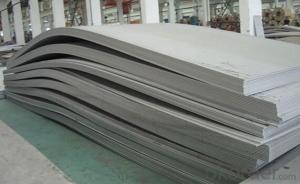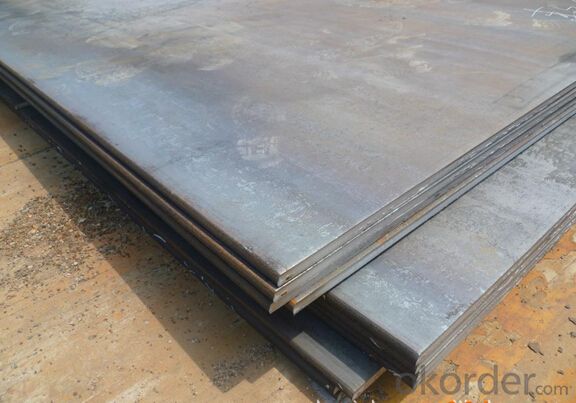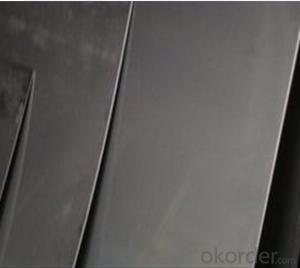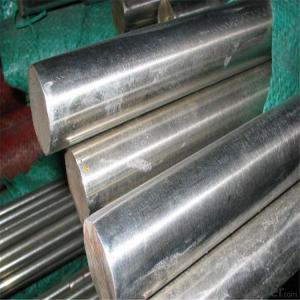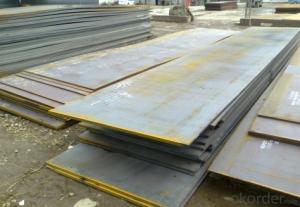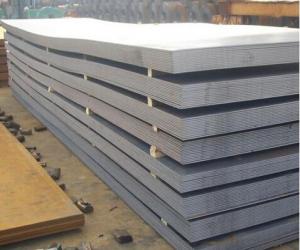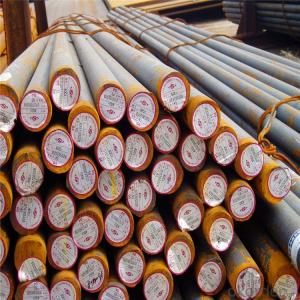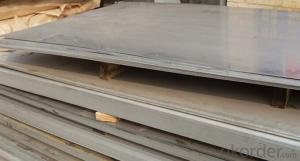Forging Steel Plates ASTM1045_Hot Rolled Carbon Steel Sheet
- Loading Port:
- Tianjin
- Payment Terms:
- TT OR LC
- Min Order Qty:
- 3 m.t.
- Supply Capability:
- 10000 m.t./month
OKorder Service Pledge
OKorder Financial Service
You Might Also Like
Specification
Specification Forging Steel Plates ASTM1045_Hot Rolled Carbon Steel Sheet
Round bar | Diameter(mm) | Length (mm) | |
10~1000 | 2000~6000 | ||
plate/sheet | Thickness(mm) | Width (mm) | Length (mm) |
10~1000 | 80~2300 | 2000~6000
|
Chemical Composition of Forging Steel Plates ASTM1045_Hot Rolled Carbon Steel Sheet
C | Si | Mn | P≤ | S≤ | Cr |
0.40~0.60 | 0.20~0.30 | 0.70~0.90 | 0.030 | 0.030 | 0.01~0.03 |
Chinese | American | German | Swedish | Japanese |
GB | AISI | DIN | ASSB | JIS |
45 | 1045 | C45/1.1191 | S45C |
Quenching | Tempering | Tensile strength | Yield strength | Elongation |
820~870 °c | 550~650 °c | ≥600MPa | ≥355MPa | ≥16%
|
Application of Forging Steel Plates ASTM1045_Hot Rolled Carbon Steel Sheet
(1) this steel is widely used in machinery manufacturing.
(2) For the manufacture of high strength requirements parts, such as gears, shafts, piston pin and the uneven force big machining parts, forgings, stampings and bolts, nuts, pipe joint.
CNBM Introduction of of Forging Steel Plates ASTM1045_Hot Rolled Carbon Steel Sheet
CNBM International Corporation is the most import and export platform of CNBM group(China National Building Material Group Corporation) ,which is a state-owned enterprise, ranked in 270th of Fortune Global 500 in 2015.
With its advantages, CNBM International are mainly concentrate on Cement, Glass, Iron and Steel, Ceramics industries and devotes herself for supplying high quality series of refractories as well as technical consultancies and logistics solution.
After-sale service |
|
Advantages
|
|
Packaging & Delivery of Forging Steel Plates ASTM1045_Hot Rolled Carbon Steel Sheet
Packaging Detail | Sea worthy packing /as per customer's packing instruction |
Delivery Detail | 15 ~ 40 days after receiving the deposit |
Products
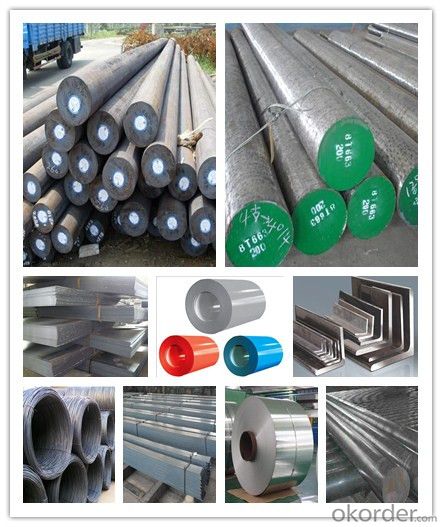
FAQ:
Are you a trading company or manufacturer? | Manufacturer |
What’s the MOQ? | 3 metric ton |
What’s your delivery time? | 15-35 days after downpayment received |
Do you Accept OEM service? | Yes |
what’s your delivery terms? | FOB/CFR/CIF |
What's the Payment Terms? | 30% as deposit,70% before shipment by T/T |
Western Union acceptable for small amount. | |
L/C acceptable for large amount. | |
Scrow ,Paybal,Alipay are also ok | |
Why choose us? | Chose happens because of quality, then price, We can give you both. Additionally, we can also offer professional products inquiry, products knowledge train (for agents), smooth goods delivery, excellent customer solution proposals. |
What's your available port of Shipment? | Main Port, China |
What’s your featured services? | Our service formula: good quality+ good price+ good service=customer's trust
|
Where are your Market? | Covering more than 160 countries in the world |
- Q: How does special steel perform in high-pressure applications?
- Special steel performs exceptionally well in high-pressure applications. Its unique properties, such as high strength, excellent corrosion resistance, and good thermal stability, make it an ideal choice for withstanding extreme pressure conditions. It maintains its structural integrity, preventing deformation or failure, even when exposed to intense pressure. Additionally, special steel's resistance to fatigue and wear ensures long-term performance and reliability in high-pressure environments.
- Q: How does precipitation-hardening steel achieve high strength through heat treatment?
- Precipitation-hardening steel achieves high strength through heat treatment by a process called aging. This involves heating the steel to a specific temperature and holding it there for a certain period of time, followed by rapid cooling. During this process, the alloying elements in the steel form fine particle precipitates, which obstruct the movement of dislocations within the crystal structure. These precipitates act as barriers that hinder the deformation of the material, resulting in increased strength.
- Q: What are the different methods for improving the tensile strength of special steel?
- There are several methods for improving the tensile strength of special steel. 1. Alloying: One common method is to add alloying elements such as chromium, nickel, molybdenum, or vanadium to the steel. These elements form solid solutions with the iron matrix, enhancing the strength and hardness of the steel. Alloying also improves the steel's resistance to corrosion and wear. 2. Heat treatment: Heat treatment is another effective method for increasing the tensile strength of special steel. Processes like quenching, tempering, and annealing are commonly used. Quenching involves rapidly cooling the steel from a high temperature, which creates a hardened microstructure. Tempering then reduces the brittleness and improves the toughness of the steel. Annealing, on the other hand, involves heating the steel to a specific temperature and then slowly cooling it, which can refine the grain structure and enhance its strength. 3. Cold working: Cold working, also known as cold rolling or cold drawing, involves subjecting the steel to plastic deformation at low temperatures. This process increases the dislocation density in the steel, resulting in strain hardening and improved strength. Cold working can significantly enhance the tensile strength of special steel. 4. Grain refinement: Refining the grain structure of the steel can also improve its tensile strength. This can be achieved through processes like recrystallization annealing, which involves heating the steel to a specific temperature and then cooling it slowly to promote the formation of smaller and more uniform grains. Smaller grain size leads to increased strength and improved mechanical properties. 5. Shot peening: Shot peening is a technique that involves bombarding the surface of the steel with small metallic or ceramic particles. This process induces compressive stresses in the surface layer of the steel, which helps to inhibit crack initiation and propagation, ultimately improving the tensile strength and fatigue resistance of the steel. It is important to note that the choice of method for improving tensile strength depends on the specific application and requirements of the special steel. Various combinations of these methods can be employed to achieve the desired mechanical properties.
- Q: What are the different methods of surface thermal spraying for special steel?
- There are several different methods of surface thermal spraying that can be used for special steel. These methods include: 1. Flame spraying: In this method, a flame or oxy-fuel source is used to melt the coating material, which is then sprayed onto the surface of the special steel. This method is commonly used for applying coatings such as zinc, aluminum, or their alloys. 2. Arc spraying: Arc spraying involves using an electric arc to melt the coating material, which is then propelled onto the surface of the special steel using compressed air. This method is often used for applying coatings such as stainless steel, nickel alloys, or copper. 3. Plasma spraying: Plasma spraying utilizes a plasma torch to heat and melt the coating material, which is then propelled onto the surface of the special steel. This method is particularly effective for applying coatings such as ceramic or metallic materials with high melting points. 4. High-velocity oxy-fuel (HVOF) spraying: HVOF spraying involves using a high-pressure combustion process to propel the coating material onto the surface of the special steel. This method produces coatings with high bond strength and density, making it suitable for applications requiring wear resistance or corrosion protection. 5. Detonation spraying: Detonation spraying utilizes a controlled detonation process to accelerate the coating material onto the surface of the special steel. This method is often used for applying coatings such as tungsten carbide or other hard materials, providing excellent wear resistance. Each of these methods of surface thermal spraying offers distinct advantages and is selected based on the specific requirements of the special steel application, including the desired coating material, thickness, and performance characteristics.
- Q: How does special steel perform in low-temperature applications?
- Special steel performs well in low-temperature applications due to its unique properties such as high strength, toughness, and resistance to brittleness. It retains its mechanical properties even at extremely cold temperatures, making it ideal for industries like aerospace, automotive, and energy where materials need to withstand challenging environments.
- Q: What are the different types of welding techniques used for special steel?
- There are several types of welding techniques used for special steel, including TIG (Tungsten Inert Gas) welding, MIG (Metal Inert Gas) welding, Stick welding, and Flux-cored arc welding. These techniques are commonly used for welding special steel due to their ability to provide strong and precise welds, ensuring the integrity and durability of the material.
- Q: How does special steel contribute to reducing product failures in high-stress applications?
- Special steel contributes to reducing product failures in high-stress applications by offering enhanced strength, durability, and resistance to corrosion and wear. The unique properties of special steel allow it to withstand extreme conditions, such as high temperatures and pressures, without deformation or failure. This ensures that the products made using special steel perform reliably and have a longer service life, minimizing the risk of failures and resulting in improved safety and cost-effectiveness in high-stress applications.
- Q: How does special steel contribute to the manufacturing of surgical instruments?
- Special steel is a crucial material in the manufacturing of surgical instruments due to its exceptional properties such as high corrosion resistance, strength, and durability. These qualities enable surgical instruments to withstand the harsh sterilization processes and provide long-lasting performance in medical settings. Additionally, special steel's ability to be shaped into intricate designs and its compatibility with sterilization methods ensures precision and hygiene in surgical procedures.
- Q: Can special steel be used in the pharmaceutical industry?
- Yes, special steel can be used in the pharmaceutical industry. Special steel, such as stainless steel, is often used in the manufacturing of pharmaceutical equipment and machinery due to its corrosion resistance, hygienic properties, and ability to withstand high temperatures and pressures. It is commonly used for the fabrication of storage tanks, piping systems, valves, and other components that come into contact with pharmaceutical products. Additionally, special steel can be easily cleaned and sanitized, making it suitable for maintaining strict cleanliness standards in pharmaceutical manufacturing processes.
- Q: What are the different corrosion-resistant coatings for special steel?
- There are several corrosion-resistant coatings available for special steel, including zinc coatings, aluminum coatings, stainless steel coatings, and ceramic coatings. These coatings provide a protective barrier that prevents the steel from coming into contact with corrosive elements, thus extending its lifespan and maintaining its structural integrity.
Send your message to us
Forging Steel Plates ASTM1045_Hot Rolled Carbon Steel Sheet
- Loading Port:
- Tianjin
- Payment Terms:
- TT OR LC
- Min Order Qty:
- 3 m.t.
- Supply Capability:
- 10000 m.t./month
OKorder Service Pledge
OKorder Financial Service
Similar products
Hot products
Hot Searches
Related keywords
